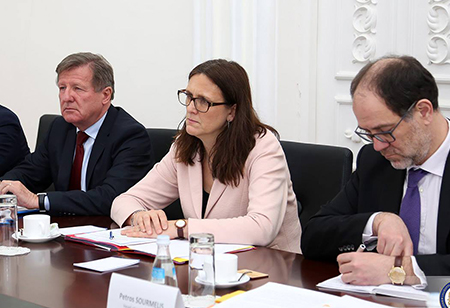Georgian products have real potential in EU, says Euro Commissioner

The European Union (EU) and Georgia are working together to grow trade relations and increase the amount of Georgia-made products to the EU market and its 500 million consumers.
Eighteen months ago Georgia’s Deep and Comprehensive Free Trade Area (DCFTA) agreement came into force and since then Georgia and the EU have both benefitted greatly from the deal, said European Commissioner for Trade Issues Cecilia Malmstrom.
Today Commissioner Malmstrom visited Georgia’s capital Tbilisi to meet politicians, business representatives, students and members of civil society to take stock of the implementation of the EU-Georgia DCFTA deal, which came into force after the Association Agreement was siged in June 2014.

Photo by MFA of Georgia.
After meeting with Georgia’s Economy Minister Dimitry Kumsishvili today, Malmstrom said it was necessary for the EU to bring in new measures so it could import Georgian honey and fish along with other agricultural products the EU already imported from Georgia.
I had a very beneficial meeting with the Minister, having discussed implementation of the Free Trade Agreement. The Minister referred to reforms as well as necessary measures to inform small and medium-sized businesses (SMEs) in preparation for the European market. [We] will deepen cooperation in order to import more Georgian products to the European market,’ Malmstrom said.
Great to be on beautiful Tblisi again. Discussing how to develop further our trade agreement and making sure SMEs are aware of the benefits.
— Cecilia Malmström (@MalmstromEU) March 21, 2016
The European Commission announced Malmstrom would launch the EU4Business initiative while in Georgia. The EU4Business was a technical and financial assistance package of EU-funded programs worth over €62 million that mainly assisted SMEs to better access the EU market.
EU4Business brings together all the EU programs assisting Georgia in its process of economic integration to the EU market, providing a clear sign of the EU's commitment towards SMEs and trade policies in Georgia,” Commissioner Malmstrom said.
From the Georgia side Economy Minister Kumsishvili accented the profit the country was receiving as a result of the DCFTA deal.
As an example he said non-EU member states were moving their factories to Georgia so they too could sell their products in the European market. He did not specify which countries had done this however he said "it was very successful” when factories had moved "from Asia”.
I will not specify the country but recently a factory that produces furniture moved to Georgia from Asia. This factory employed 200 people,” Kumsishvili said.
While in Tbilisi Commissioner Malmstrom met Georgia’s President, Prime Minister and Foreign Minister.
In Tbilisi. Discussing EU-#Georgia free trade area, 18 months in. @JanelidzeMkh providing a good overview /JL pic.twitter.com/iRYlFPFuVN
— Cecilia Malmström (@MalmstromEU) March 21, 2016
Prime Minister Giorgi Kvirikashvili thanked Commissioner Malmstrom for her contribution to help Georgia implement its Visa Liberalisation Action Plan (VLAP).
Also today Malmstrom met representatives from the local business community at the EU-Georgia Business Council, after which she held a lecture at ISET (International School of Economy) for students and reporters.
In her speech at ISET Commissioner Malmstrom noted the good progress Georgia had made to implement its trade agreement and to gain access to the EU market.
We have already seen success stories. Georgian blueberries and kiwifruit can now be purchased in supermarkets in the UK and in Germany,” she said.
These are early but encouraging signs of the capacity of Georgian products. Meeting the legal requirements to sell food in the EU is a major achievement and these products are just the start. There is real potential for other Georgian products, like honey and fish, in the future,” Malmstrom said.
The EU-Georgia DCFTA has strengthened the trade relationship between the EU and Georgia. Today the EU is Georgia's first export destination, receiving 29 percent of Georgian exports - an increase of 15 percent in the first year of the trade agreement. Total trade between the two amounted to over €2.5 billion last year.

Photo by EU Trade/Twitter.
Meanwhile, today the National Statistics Office of Georgia published data about Georgia’s External Merchandise Trade, which said in January-February 2016 the external trade turnover of Georgia with EU countries reached $532 million USD. This was 38 percent more compared to the same months of 2015.
Geostat said the value of exports reached $77 million (28 percent lower), while imports reached $454 million (63 percent higher).
In general 44 percent of Georgia’s trade deficit came from EU countries in January-February 2016, said Geostat.
 Tweet
Tweet  Share
Share